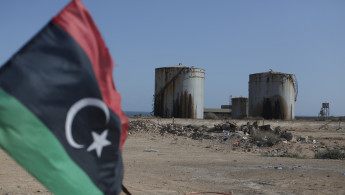Talks at UN fail to resolve Libya elections stalemate
Talks between rival Libyan institutions aimed at breaking the deadlock over the rules for long-awaited elections failed to resolve key differences, the United Nations said Thursday.
Parliament speaker Aguila Saleh and President of the High Council of State Khaled Al-Mishri met at the UN in Geneva for three days of talks to discuss the draft constitutional framework for elections.
But while some progress was made, it was not enough to move forward towards national polls, with the two sides still at odds over who can stand in presidential elections, said the UN's top Libya envoy Stephanie Williams, who facilitated the talks.
Presidential and parliamentary elections, originally set for December last year, were meant to cap a UN-led peace process following the end of the last major round of violence in 2020.
But the vote never took place due to several contentious candidacies and deep disagreements, over the polls' legal basis, between rival power centres in the east and west of the country.
A week of talks earlier this month in Cairo between the Tripoli-based High Council and Saleh's eastern-based House of Representatives (HoR), aimed at agreeing on a constitutional basis for a vote, ended without a breakthrough.
Williams said that following the talks in Geneva and Cairo, several points had been agreed.
They included the designation of the headquarters and distribution of seats for both chambers, and the division of responsibilities between the president, prime minister, cabinet and local government.
They have also reached consensus on decentralisation, including the number of governorates and their powers; revenue allocation mechanisms for the different levels of government; and increased representation for cultural components, said Williams.
"Disagreement persists on the eligibility requirements for the candidates in the first presidential elections," she said in a statement.
"While the progress secured during three rounds of consultations in Cairo and this round in Geneva is significant, it remains insufficient as a basis to move forward towards comprehensive national elections."
Libya has been split between a Government of National Accord (GNA) in Tripoli, and the eastern-based HoR, backed by military leader Khalifa Haftar.
According to Libyan media, the spat over presidential candidate eligibility relates to whether dual nationals can stand; Haftar holds US nationality.
"I urge the two chambers to overcome the pending disagreement as soon as possible," said Williams, urging "calm and stability".
She said the UN would remain available to help reach an agreement to end the country's long transition period.
Williams said she would present recommendations on alternative ways forward to UN Secretary-General Antonio Guterres.
The prospect of elections appears as distant as ever since the HoR, elected in 2014, appointed a rival government to replace that of interim prime minister Abdulhamid Dbeibah, arguing that his mandate has expired.
After failing to enter Tripoli in an armed stand-off in May, the rival administration has taken up office further east in Sirte.
Sirte is the hometown of dictator Moamer Kadhafi, whose overthrow in a NATO-backed revolt in 2011 plunged the country into years of chaos and violence.
Recent weeks have seen repeated skirmishes between armed groups in Tripoli, prompting fears of a return to full-scale conflict.





 Follow the Middle East's top stories in English at The New Arab on Google News
Follow the Middle East's top stories in English at The New Arab on Google News


